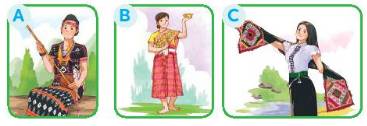How many/ groups/ languages/ all ethnic groups/speak?

Những câu hỏi liên quan
IV. Complete each sentence with a suitable question word.1. _____________ ethnic group has larger population, Cho Ro or Chu Ru? – ChoRo.2. _____________ groups of languages do all ethnic groups speak? – Eightgroups.3. _____________ is the biggest house in the village? – It’sthe communal house.4. _____________ arts are displayed in a museum in Da Nang city? – TheCham’s.5. _____________ do the San Diu mainly live? – InQuang Ninh province.6. _____________ do the Thai hold ceremonies to worship thei...
Đọc tiếp
IV. Complete each sentence with a suitable question word.
1. _____________ ethnic group has larger population, Cho Ro or Chu Ru? – ChoRo.
2. _____________ groups of languages do all ethnic groups speak? – Eightgroups.
3. _____________ is the biggest house in the village? – It’sthe communal house.
4. _____________ arts are displayed in a museum in Da Nang city? – TheCham’s.
5. _____________ do the San Diu mainly live? – InQuang Ninh province.
6. _____________ do the Thai hold ceremonies to worship their ancestors? – Everyyear.
7. _____________ is the village chief of the Phu La? – Theoldest man.
8. _____________ is it from here, to the communal house? – Justabout one kilometre.
9. _____________ is “khan pieu”? – It’s a shawl with colorful embroidery.
10. _____________ do they cook five coloured sticky rice? – Onspecial occasions.
1. Which
2. How many
3. What
4. Whose
5. Where
6. How often
7. Who
8. How far
9. What
10. When
Đúng 3
Bình luận (0)
Talk about life of ethnic group ( population,region,languages,activities,festival)
1 How many groups an thre in Viet Nam?
2 Which ethnic group has the largest population?
QUIZ. How much do you know about ethnic groups in Viet Nam?1. There are ____________ ethnic groups in Viet Nam.A. 63 B. 45 C. 542. Ethnic minority groups form about ____________ of the total population of Viet Nam.A. 7% B. 13% C. 25%3. They mainly live ____________.A. in the lowlands B. in the mountains C. in the Mekong Delta...
Đọc tiếp
QUIZ. How much do you know about ethnic groups in Viet Nam?
1. There are ____________ ethnic groups in Viet Nam.
A. 63 B. 45 C. 54
2. Ethnic minority groups form about ____________ of the total population of Viet Nam.
A. 7% B. 13% C. 25%
3. They mainly live ____________.
A. in the lowlands B. in the mountains C. in the Mekong Delta
4. The Jrai decorate houses for the dead with a lot of ____________.
A. wood statues B. flowers C. colourful pictures
5. The Khmer mostly earn their living from weaving and _____________.
A. farming B. hunting C. fishing
6. Picture ____________ shows a Thai woman's costume.

1. There are 54 ethnic groups in Viet Nam.
(Có 54 dân tộc ở Việt Nam.)
2. Ethnic minority groups form about 13% of the total population of Viet Nam.
(Những dân tộc thiểu số hình thành nên 13% tổng dân số Việt Nam.)
3. They mainly live in the mountain.
(Họ chủ yếu sống trên núi.)
4. The Jrai decorate houses for the dead with a lot of wood statues.
(Người Gia Rai thường trang trí nhà của những người đã khuất với rất nhiều tượng gỗ.)
5. The Khmer mostly earn their living from weaving and farming.
(Người khơ me hầu hết sống bằng nghề dệt và nghề nông.)
6. Picture C shows a Thai woman's costume.
(Bức tranh C cho thấy trang phục của một phụ nữ dân tộc Thái.)
Đúng 0
Bình luận (0)
Ex 4 : Make up sentences using the words and phrases given:
1. some/ groups/ like/ the Tay, Hmong, Yao/ live/ mostly/ mountainous/ regions/ north.
2. “ethnic minority people”/ speak/ own languages/ have/ own/ life/ customs/ and/ traditions.
3. our country/ government/ always/ take care/ people’s life/ especially/ the ethnic groups’.
4. the Muong/ Hoa Binh and Thanh Hoa/ well-known/ their/ rich/ folk literature/ traditional songs.
5. many/ ethnic minority children/ in/ re...
Đọc tiếp
Ex 4 : Make up sentences using the words and phrases given:
1. some/ groups/ like/ the Tay, Hmong, Yao/ live/ mostly/ mountainous/ regions/ north.
2. “ethnic minority people”/ speak/ own languages/ have/ own/ life/ customs/ and/ traditions.
3. our country/ government/ always/ take care/ people’s life/ especially/ the ethnic groups’.
4. the Muong/ Hoa Binh and Thanh Hoa/ well-known/ their/ rich/ folk literature/ traditional songs.
5. many/ ethnic minority children/ in/ remote or mountainous areas/ studying/ at/ boarding schools.
Ex 4 : Make up sentences using the words and phrases given:
1. some/ groups/ like/ the Tay, Hmong, Yao/ live/ mostly/ mountainous/ regions/ north.
-> Some groups like the Tay, Hmong, Yao live mostly in mountainous regions in the north.
2. “ethnic minority people”/ speak/ own languages/ have/ own/ life/ customs/ and/ traditions.
-> "Ethnic minority people" speak their own languages and have their own life's customs and traditions.
3. our country/ government/ always/ take care/ people’s life/ especially/ the ethnic groups’.
-> Our country's government always take care of people's life especially the ethnic groups'.
4. the Muong/ Hoa Binh and Thanh Hoa/ well-known/ their/ rich/ folk literature/ traditional songs.
-> The Muong group in Hoa Binh and Thanh Hoa are well-known for their rich folk literature and traditional songs.
5. many/ ethnic minority children/ in/ remote or mountainous areas/ studying/ at/ boarding schools.
-> Many ethnic minority children in remote or mountainous areas are studying at boarding schools.
Đúng 0
Bình luận (0)
1. some/ groups/ like/ the Tay, Hmong, Yao/ live/ mostly/ mountainous/ regions/ north.
-> Some groups like the Tay, Hmong, Yao live mostly in the mountainous regions in the North.
2. “ethnic minority people”/ speak/ own languages/ have/ own/ life/ customs/ and/ traditions.
-> " Ethnic minority peoples " speak their own languages and have their own way of life, customs and traditions.
3. our country/ government/ always/ take care/ people’s life/ especially/ the ethnic groups’.
-> Our country government always takes care of the people's life especially the ethnic group's.
4. the Muong/ Hoa Binh and Thanh Hoa/ well-known/ their/ rich/ folk literature/ traditional songs.
-> The Muong in Hoa Binh and Thanh Hoa are well-know for their rich folk literature and traditional songs.
5. many/ ethnic minority children/ in/ remote or mountainous areas/ studying/ at/ boarding schools.
-> Many ethnic minority children in remote or mountainous areas are studying at boarding schools.
Đúng 0
Bình luận (0)
1. Some groups like the Tay, Hmong, Yao... live mostly in themountainous regions in the north, and the Cham, Khmer, Ede... live in the Central Highlands and some southern provinces.
Đúng 0
Bình luận (3)
1. How many/ groups of people/ there/ your country? A. How many groups of people are there in your country? B. How many groups of people is there in your country? C. How many groups of people are there on your country? D. How many groups of people is there of your country?2. wear/ occasions/ special/ on/ women/ Korean/ Hanbok/ usually A. Korean women usually wear on Hanbok special occasions. B. Korean women wear usually Hanbok on special occasions. C. Korean women usually wear special Han...
Đọc tiếp
1. How many/ groups of people/ there/ your country?
A. How many groups of people are there in your country?
B. How many groups of people is there in your country?
C. How many groups of people are there on your country?
D. How many groups of people is there of your country?
2. wear/ occasions/ special/ on/ women/ Korean/ Hanbok/ usually
A. Korean women usually wear on Hanbok special occasions.
B. Korean women wear usually Hanbok on special occasions.
C. Korean women usually wear special Hanbok on occasions.
D. Women on Korean usually wear Hanbok special occasions.
3. Many teenagers/ addicted/ the Internet/ computer games.
A. Many teenagers are addicted to the Internet and computer games.
B. Many teenagers are addicted with the Internet and computer games.
C. Many teenagers have addicted to the Internet and computer games.
D. Many teenagers are addicted on the Internet and computer games.
4. The Giong Festival/ held/ the 6th/ the 12th/ the 4th lunar month/ several venues around Ha Noi.
A. The Giong Festival is held from the 6th to the 12th of the 4th lunar month in several venues around Ha Noi.
B. The Giong Festival was held from the 6th to the 12th of the 4th lunar month in several venues around Ha Noi.
C. The Giong Festival is held from the 6th of the 12th to the 4th lunar month in several venues around Ha Noi.
D. The Giong Festival were held from the 6th to the 12th of the 4th lunar month at several venues around Ha Noi.
5. Watching TV/ most/ popular/ leisure activity/ Britain?
A. Is watching TV the most popular leisure activity in Britain?
B. Is watching TV most popular leisure activity in Britain?
C. Is watching TV the most popular leisure activity into Britain?
D. Does watching TV is the most popular leisure activity in Britain?
6. Children/ like/ Tet/ long holiday/ can/ also/ receive/ lucky money.
A. Children likes Tet because it’s a long holiday and, they can also receive lucky money.
B. Children like Tet because it’s a long holiday. Moreover, they can also receive lucky money.
C. Children like Tet when it’s a long holiday. However, they can also receive lucky money.
D. Children like Tet because it’s a long holiday. Therefore, they can also receive lucky money
7. If/ a/ should/ Vietnamese/ home/ bring/ invited/ to/ gift/ you/ a/ small
A. If you should bring a small gift, when you are invited to a Vietnamese home.
B. If you are invited to a home Vietnamese, you should bring a gift small.
C. If you are invited to a Vietnamese home, you should bring a small gift.
D. You are invited to a Vietnamese home If you should bring a small gift.
8. Vietnam/ Tay/ second/ the/ largest/ the/ ethnic/ group/
A. The Tay is the second largest ethnic group in Vietnam.
B. The Tay are the second largest ethnic groups of Vietnam.
C. The Tay are second largest ethnic group in Vietnam.
D. The Tay are the second largest ethnic group in Vietnam.
9. important/ Health/ than/ money.
A. Health is more important than money
B. Health is the most important than money
C. Health is more importanter than money
D. Health are more important than money.
10. How/ spring festival/ Bai Dinh Pagoda/ last?
A. How often do the spring festival in Bai Dinh Pagoda last?
B. How long does the spring festival of Bai Dinh Pagoda last?
C. How old do the spring festival at Bai Dinh Pagoda last?
D. How does the spring festival of Bai Dinh Pagoda last?1. How many/ groups of people/ there/ your country?
A. How many groups of people are there in your country?
B. How many groups of people is there in your country?
C. How many groups of people are there on your country?
D. How many groups of people is there of your country?
2. wear/ occasions/ special/ on/ women/ Korean/ Hanbok/ usually
A. Korean women usually wear on Hanbok special occasions.
B. Korean women wear usually Hanbok on special occasions.
C. Korean women usually wear special Hanbok on occasions.
D. Women on Korean usually wear Hanbok special occasions.
3. Many teenagers/ addicted/ the Internet/ computer games.
A. Many teenagers are addicted to the Internet and computer games.
B. Many teenagers are addicted with the Internet and computer games.
C. Many teenagers have addicted to the Internet and computer games.
D. Many teenagers are addicted on the Internet and computer games.
4. The Giong Festival/ held/ the 6th/ the 12th/ the 4th lunar month/ several venues around Ha Noi.
A. The Giong Festival is held from the 6th to the 12th of the 4th lunar month in several venues around Ha Noi.
B. The Giong Festival was held from the 6th to the 12th of the 4th lunar month in several venues around Ha Noi.
C. The Giong Festival is held from the 6th of the 12th to the 4th lunar month in several venues around Ha Noi.
D. The Giong Festival were held from the 6th to the 12th of the 4th lunar month at several venues around Ha Noi.
5. Watching TV/ most/ popular/ leisure activity/ Britain?
A. Is watching TV the most popular leisure activity in Britain?
B. Is watching TV most popular leisure activity in Britain?
C. Is watching TV the most popular leisure activity into Britain?
D. Does watching TV is the most popular leisure activity in Britain?
6. Children/ like/ Tet/ long holiday/ can/ also/ receive/ lucky money.
A. Children likes Tet because it’s a long holiday and, they can also receive lucky money.
B. Children like Tet because it’s a long holiday. Moreover, they can also receive lucky money.
C. Children like Tet when it’s a long holiday. However, they can also receive lucky money.
D. Children like Tet because it’s a long holiday. Therefore, they can also receive lucky money
7. If/ a/ should/ Vietnamese/ home/ bring/ invited/ to/ gift/ you/ a/ small
A. If you should bring a small gift, when you are invited to a Vietnamese home.
B. If you are invited to a home Vietnamese, you should bring a gift small.
C. If you are invited to a Vietnamese home, you should bring a small gift.
D. You are invited to a Vietnamese home If you should bring a small gift.
8. Vietnam/ Tay/ second/ the/ largest/ the/ ethnic/ group/
A. The Tay is the second largest ethnic group in Vietnam.
B. The Tay are the second largest ethnic groups of Vietnam.
C. The Tay are second largest ethnic group in Vietnam.
D. The Tay are the second largest ethnic group in Vietnam.
9. important/ Health/ than/ money.
A. Health is more important than money
B. Health is the most important than money
C. Health is more importanter than money
D. Health are more important than money.
10. How/ spring festival/ Bai Dinh Pagoda/ last?
A. How often do the spring festival in Bai Dinh Pagoda last?
B. How long does the spring festival of Bai Dinh Pagoda last?
C. How old do the spring festival at Bai Dinh Pagoda last?
D. How does the spring festival of Bai Dinh Pagoda last?
Write questions from the clues 1. you / attend / the Khmer’s Moon Worship Festival / last year / ?_______________________________2. How many / ethnic minority groups / Viet Nam / ?_______________________________3. Where / the Hmong / live / ?_______________________________4. What / you / do / the Ede’s Harvest Festival / last October / ?_______________________________5. How old / minority children / when / they / start helping / the family / ?_______________________________
Đọc tiếp
Write questions from the clues
1. you / attend / the Khmer’s Moon Worship Festival / last year / ?
_______________________________
2. How many / ethnic minority groups / Viet Nam / ?
_______________________________
3. Where / the Hmong / live / ?
_______________________________
4. What / you / do / the Ede’s Harvest Festival / last October / ?
_______________________________
5. How old / minority children / when / they / start helping / the family / ?
_______________________________
Write questions from the clues
1. you / attend / the Khmer’s Moon Worship Festival / last year / ?
______________Did you attend the Khmer's Moon Worship Festival last year?_________________
2. How many / ethnic minority groups / Viet Nam / ?
___________How many ethnic minority groups in Viet Nam?____________________
3. Where / the Hmong / live / ?
_____________Where is the Hmong live?__________________
4. What / you / do / the Ede’s Harvest Festival / last October / ?
________________What did you do in the Ede's Harvest Festival last October?_______________
5. How old / minority children / when / they / start helping / the family / ?
__________________How old the minority children when they start helping the family?_____________
Đúng 4
Bình luận (0)
1. Did you attend the Khmer's Moon Worship Festival last year?
2. How many ethnic minority groups in Viet Nam?
3. Where is the Hmong live?
4. What did you do in the Ede's Harvest Festival last October?
5. How old the minority children when they start helping the family?
Đúng 1
Bình luận (0)
Each sentences has an error. Find and correct it.
Sentence
error
Correction
1. They travel to a nearest town to go shoppig
2. Some ethnic minority children of this region are studying at the boarding school in a city.
3. Although they speak different languages, an ethnic groups in this region live near to one another.
4. In the past, some ethnic groups lived the semi-nomadic life.
5. All an e...
Đọc tiếp
Each sentences has an error. Find and correct it.
| Sentence | error | Correction |
| 1. They travel to a nearest town to go shoppig | ||
| 2. Some ethnic minority children of this region are studying at the boarding school in a city. | ||
| 3. Although they speak different languages, an ethnic groups in this region live near to one another. | ||
| 4. In the past, some ethnic groups lived the semi-nomadic life. | ||
| 5. All an ethnic peoples of Viet Nam have equality in every field. | ||
| Sentence | error | Correction |
| 1. They travel to a nearest town to go shoppig | a nearest | the nearest |
| 2. Some ethnic minority children of this region are studying at the boarding school in a city. | the | a |
| 3. Although they speak different languages, an ethnic groups in this region live near to one another. | groups | group |
| 4. In the past, some ethnic groups lived the semi-nomadic life. | the | a |
| 5. All an ethnic peoples of Viet Nam have equality in every field. | an |
Đúng 0
Bình luận (0)
Each sentences has an error. Find and correct it.
| Sentence | error | Correction |
| 1. They travel to a nearest town to go shopping | a | the |
| 2. Some ethnic minority children of this region are studying at the boarding school in a city. | a | the |
| 3. Although they speak different languages, an ethnic groups in this region live near to one another. | an | the |
| 4. In the past, some ethnic groups lived the semi-nomadic life. | the semi-nomadic life | semi-nomadic life |
| 5. All an ethnic peoples of Viet Nam have equality in every field. | an | the |
Đúng 0
Bình luận (0)
III. Choose the best answer by circling A, B, C or D to complete the sentences. (2 pts)1. Many ethnic groups have their own languages, and some even have ____ languages.A. speaking B. listened C. read D. written2. The ____ have a very hard life. They cannot live permanently in on place.A. farmers B. nomads C. workers D. villagers3. I love ____ with my best friend. We often go window-shopping or to the cinema.A. Chatting B. studying C. herding D. hanging out4. People in the countryside are ______...
Đọc tiếp
III. Choose the best answer by circling A, B, C or D to complete the sentences. (2 pts)
1. Many ethnic groups have their own languages, and some even have ____ languages.
A. speaking B. listened C. read D. written
2. The ____ have a very hard life. They cannot live permanently in on place.
A. farmers B. nomads C. workers D. villagers
3. I love ____ with my best friend. We often go window-shopping or to the cinema.
A. Chatting B. studying C. herding D. hanging out
4. People in the countryside are _______ than those in the city.
A. the more helpful B. more helpful C. most helpful D. helpful
5. Many ethnic groups have their own languages, and some even have ____ languages.
A. spoken B. listened C. read D. written
6. Five - coloured ____ is a traditional dish of many ethnic minorities in mountainous regions.
A. food B. costume C. sticky rice D. egg
7. The ____ have a very hard life. They cannot live permanently in one place.
A. farmers B. nomads C. workers D. villagers
8. Hoa adores ______ to music, especially pop music in her free time.
A. listening B. playing C. speaking D. hearing
Mark the letter A, B, C, or D to indicate the word or phrase that is OPPOSITE in meaning to the italic part in each of the following questions. 1. Many ethnic groups have their own languages and some even have written languages.A. spoken B. foreign C. international D. contry2. Mr. Smith’s new neighbors appear to be very friendly. A. unhappy B. generous C. unfriendly D. sastified3. The ethnic minority people in the village are very friendly. A. majority B. much C. a few D.mostly4. People in some...
Đọc tiếp
Mark the letter A, B, C, or D to indicate the word or phrase that is OPPOSITE in meaning to the italic part in each of the following questions.
1. Many ethnic groups have their own languages and some even have written languages.
A. spoken B. foreign C. international D. contry
2. Mr. Smith’s new neighbors appear to be very friendly.
A. unhappy B. generous C. unfriendly D. sastified
3. The ethnic minority people in the village are very friendly.
A. majority B. much C. a few D.mostly
4. People in some far-away mountainous regions still keep their traditional way of life.
A. simple B. remote C. modern D. urban
5. Gathering and hunting still play an important role in the economy of the Laha
A. simple B. Easy C. developed D. insignificant
6. She had many drawbacks in a small apartment in Boston.
A. advantages B. disadvantages C. comfortables D. convinience


























